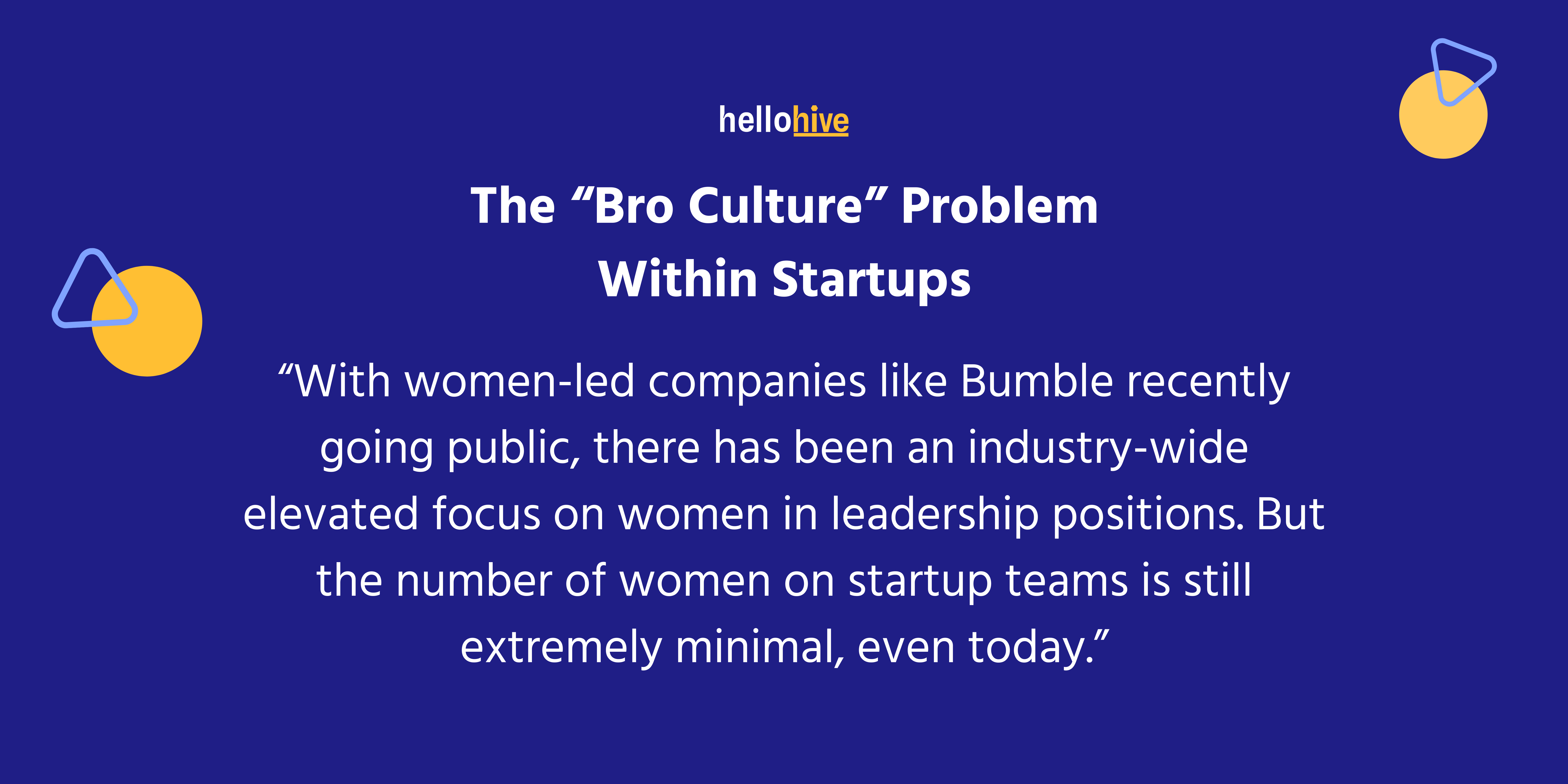The Modern Startup Environment
Let’s talk about startups. The traditional impression of startups is college-aged bros, sitting alone in their dorm room, coding away on their computers, ready to launch the next Facebook or Apple.
However, in 2021, the typical startup workplace looks more like teams working remotely, communicating through Slack and various Zoom calls, with dedicated team members on Marketing, Finance, Product, and the like.
The way that a startup is run heavily impacts how a company grows. The way I see it, company leadership is a key contributor to the overall workplace culture.
Women in the Startup Landscape
Taking a look at the current startup landscape, there are a few notable companies that have attained high standings. With women-led companies like Bumble recently going public, there has been an industry-wide elevated focus on women in leadership positions.
But the number of women on startup teams is still extremely minimal, even today. A key part of this problem is what most consider the ‘Silicon Valley’ phenomenon – a classic inner circle that severely favors the idea of bro culture, which, in turn, alienates the number of women that work within the startup space.
Statistics on Female Representation in Startups
Statistically, less than half of startups have women on their founding team. According to BizJournals, from 2009 to 2019, the number of female-founded startups doubled from 10% to 20%. Although this is a step in the right direction, that number is still too low.
While it is amazing that Bumble’s founder & CEO, Whitney Wolfe Herd, is one of the youngest women to achieve this level of success, and the numbers of female-run businesses are on the rise, this step forward is still hindered by how startup culture favors young men — and does not seem to be putting a stop to the blatant issues that are present.
Understanding “Bro Culture”
Now, what does “bro culture” actually mean? Bro culture refers to the culture where typically young male professionals are ultra-competitive about the workplace, trying to get a ‘leg up’ on their colleagues. In those cases, workplaces become more like professional frat houses and in some instances, hazing is even part of the new hire requirement.
As depicted in a LinkedIn article by Carmen M C., corporate hazing can severely impact the work that a new hire is doing, and further alienates them in a new setting. Corporate hazing isn’t the typical frat house activity of being forced to drink or assault but also includes emotional distress and bullying.
In these dangerous environments, individuals working in leadership positions care more about winning than the collective team effort it takes to build a successful company. They are not above undercutting others on their team – and this usually means they create a toxic work environment.
Hiring Practices and Discrimination
Hiring is done based on “culture fit” over experience. Women and minorities are rarely hired, and the chances of being promoted for those team members from diverse backgrounds are slim to none.
This issue of bro culture is still prominent in 2021, with issues like the gender pay gap and sexual harassment still occurring in the workplace.
Gender Disparities in Technology Companies
In technology companies, there is a 15%-30% gender gap in equity-based awards, as found by a study published in the Journal of Applied Psychology. Discrimination and harassment contribute to the culture problem, and in Gallup’s workplace report, 45% of Americans experienced some sort of discrimination or harassment at their job.
Case Study: Whitney Wolfe Herd and Bumble
This culture is especially present in the tech industry, where there is a lack of females in early-stage companies and much fewer females in leadership roles. Bumble’s Whitney Wolfe Herd’s experience working in startups is a prime example of how bro culture is present — and places women in a disadvantaged position.
Let’s dive a little deeper into her history working in startup leadership.
Herd’s Journey at Tinder
Herd was a co-founder of Tinder and was integral in their strategy to rapidly take over the college dating scene. However, she had to face a lot of difficult situations working at Tinder, with derogatory messages from her male superiors and her hostile work environment, stemming from the common misogyny within tech workforces.
She sued the company in 2014 with allegations of sexual harassment and discrimination. Following her exit, she founded Bumble, now one of Tinder’s largest rivals in the dating app world. Bumble’s company culture is founded based on female empowerment, with their dating platform only allowing women to make the first move. Their mission promotes values to end misogyny stemming from traditional gender roles.
The Success of Bumble
Wolfe’s time at Tinder is an example of this ever-persistent problem of bro culture present in the startup workplace. Executives in these environments are too focused on growth and sales and don’t bat an eye at how goals are accomplished. From the get-go, Wolfe’s work with Bumble advances what all startup culture should work towards. The central focus of her business is a simple one – putting women first. Wolfe also led the company to its success while raising a family, something that many businesswomen are scrutinized for doing.
“Bro Culture” in Venture Capital
While we’ve focused mostly on the problems of toxic workplace culture that startups typically battle with, it is also only fair that we take a look at the same issue present in the Venture Capital space.
Gender Disparities in VC Funding
Venture Capitalists have a history of favoring white, male-founded companies. In 2020, only 2.3% of Venture Capital funding went to women-led startups, according to a report from the Harvard Business Review.
This figure dropped from the 2.8% figure in 2019 — and both numbers are heavily disproportionate to the industry. Also, according to HBR, only 12% of VC firm decision-makers are female, and most firms don’t have a female partner. Taking into consideration that women make up nearly half of the VC workplace, that percentage of decision-makers is unreasonable.
The Need for Change
So, how does this industry need to change?
Within the startup space, founding teams need to take a deeper look at their core values and focus on implementing and promoting diversity and inclusion initiatives in their workplaces.
The same goes for the VC industry — leaders within the venture capital world should also take a good, hard look at their demographics, especially given that many venture capitalists are the backers to a significant portion of the industry’s most successful startups.
The Importance of Diversity in Leadership
For startups, venture capital firms, and any businesses in general, if there are no women in the decision-making process, that’s a critical problem.
A lack of women at the table translates to the abysmal numbers of women-led startups being funded. Of course, financial figures speak for themselves. A McKinsey report in 2018 showed that there was a positive correlation between having higher levels of gender diversity and a higher likelihood of financial outperformance at the executive level.
Additionally, historically underrepresented communities also need to be included in startup leadership roles, and not only as part of the Diversity and Inclusion division. The 2018 McKinsey report found that businesses with the most ethnically diverse leadership team were 33% more likely to outperform on profitability.
Personal Experience with Gender Bias
In my own experience, I’ve had the opportunity to co-found my own business – Orenda Change. Orenda Change is a social impact-focused clothing line, founded by POC women. We’re just under a year old, but even in our short time in business, my co-founder and I have experienced some of the implicit gender bias within startup culture.
When going to the bank, or working on incorporating our business, the individuals we tend to talk to immediately assume that we have a male co-founder. We’ve encountered condescending male startup founders talking to us about basic startup information. We’ve even been asked: ‘What we’re going to do with our business when we have kids?’ For reference, I’m 19 and my co-founder is 20 – kids are not on the radar for us in the near future.
But by watching women like Whitney Wolfe Herd crush it at the top level, we hope to continue to grow Orenda Change and share our experiences to eventually build a women-powered team.
We’re doing our part to create a better future for startups, but we need other founders to help, too.
At the moment, startup culture heavily favors that toxic ‘bro culture,’ and that needs to change. That change starts at the leadership level. If you’re a leader in an early-stage venture, it’s on you to make sure you have a commitment to diversity and inclusion – and that starts with who is on your teams.





